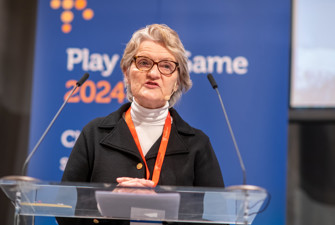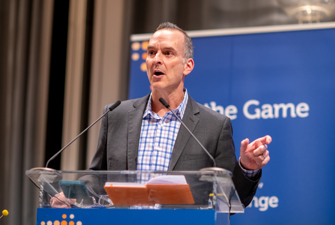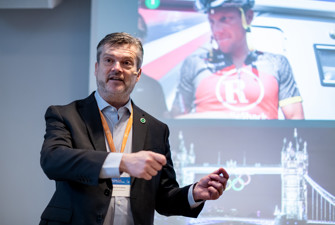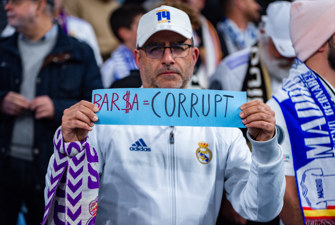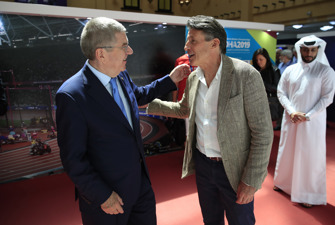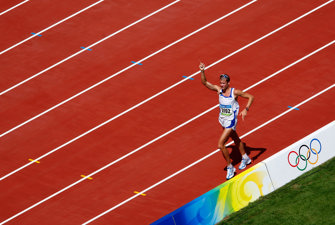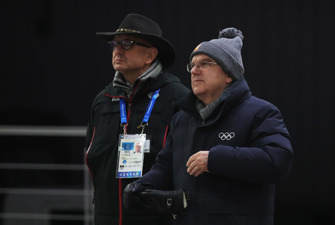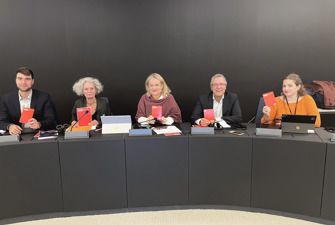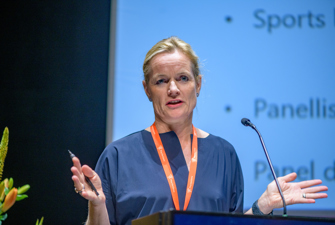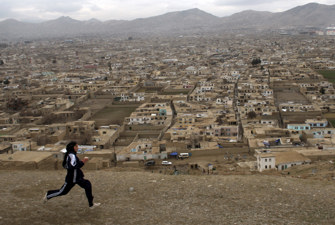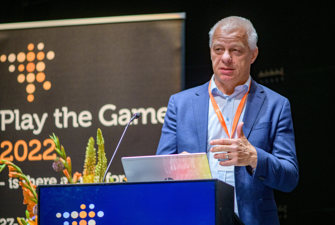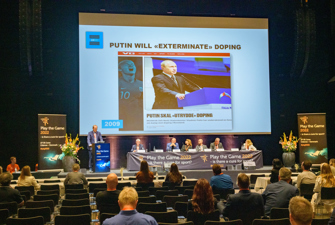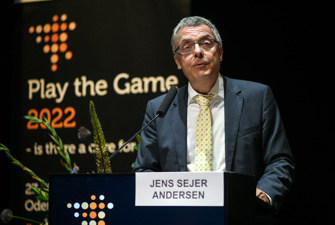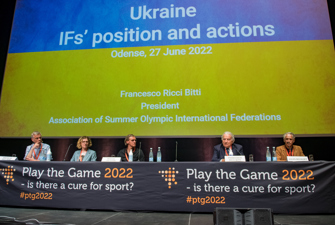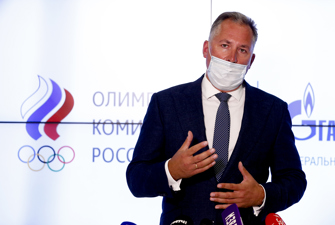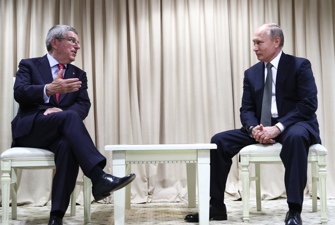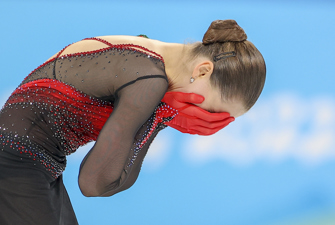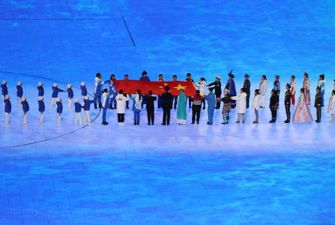FBI and Swiss police dig into weightlifting scandal, while IOC is undecided
U.S. authorities are now taking a deep look into the widespread corruption and doping fraud at the IWF. Letters reveal how the weightlifting president protected dopers, and Swiss investigators may find answers to why the IOC for ten years pushed critical information on weightlifting corruption aside.
“Up to loud yelling”.
This is how the dismissed interim head of the International Weightlifting Federation (IWF), Ursula Papandrea from the U.S., describes the negative reaction from the organisation’s Executive Board when she had invited an athlete representative to listen in on a board meeting without voting rights.
As part of her reform programme, Papandrea had set up a new Athletes’ Commission with the British weightlifter Sarah Davies as chair. Davies and her colleagues are among those calling for the resignation of the whole IWF Executive Board following the revelations of massive corruption and doping fraud.
For the weightlifters, it all comes down to doping and the unfair state of play that the IWF officials forced them to participate in – and continue to do, when they work to change the Olympic Qualifying System and to get suspended nations back in the game.
Athletes had already lost trust in IWF before its president Tamás Aján was forced to resign. Nothing has changed for them. More than 13,000 signatures have been collected in a petition initiated by Davies to "push for a vote of no confidence of the IWF Executive Board".
But the old guard is not listening.
Not even the doping past from the Aján era has been cleaned up. Recently, the International Testing Agency, an institution set up by the IOC to carry out doping testing in sport, reported 72 pending potential doping cases from 2009 to 2019. They were discovered during an IWF investigation made by the Canadian lawyer Richard H. McLaren who suggested the cases were never followed up by Aján's IWF.
These open files are now being investigated by the World Anti-Doping Agency (WADA). They could correct the medal tables and provide information about who Aján was protecting. Despite mind-boggling findings in the McLaren report, the former IWF President still claims his innocence.
Doping protection for Azerbaijan
But recently, we found a fresh glimpse of how Aján personally protected dopers against the rules. Kindly tolerated by WADA, where Aján was member of the Foundation Board.
It concerns a case that we have already been on the trail of for the film "The Lord of the Lifters". It leads to Azerbaijan, to the oil-rich realm of Ilham Aliyev, president of his country and president of its National Olympic Committee, a valued partner in the Olympic world as a generous organiser of big events.
The weightlifting federation there is headed by one of the country's most important oligarchs: Jahangir Askerov, in his day job chairman of the state airline AZAL. In 2013 his lifters were caught with 23 positive samples. But the Azerbaijani dopers were not immediately suspended. Instead, they were allowed to continue to compete and win medals.
One year ago, when we wanted to know how such a thing was possible, the answers left a lot to be desired. No response from IWF President Aján. WADA told us succinctly that they had sent the IWF several reminders.
Now two illuminating letters from 2013 have been discovered in the depths of the reconstructed IWF servers. The first is from October 2013. Shortly before that, and after the first cases in March, eight more Azeris had delivered positive samples.
Aján writes that it was "a terrible mistake" that he did not take "stricter" action against Azerbaijani dopers in the spring. And he is indignant: "This is clearly a moral massacre regarding the athletes". He calls on his partner Askerov "to ensure that none of these athletes will take part in the upcoming World Championships".
It turned out quite differently. The athletes, who had been caught months ago, took part in the IWF World Championships. At the IWF Grand Prix in Baku in early December 2013, Aján even posed with some of the dopers in front of the camera.
What had happened? Investigators will have to solve this mystery, but a second letter that Aján wrote to his Azeri friends two days after the Grand Prix leaves no questions behind regarding Aján’s own role:
"What we have done for your athletes and Federation is something the IWF has never done before and not willing or able to do in the future. The knot tightens around my neck and my 45 years work could go down in a blink. ... At the moment, my biggest concern is when and what the IWF shall report to WADA related to the 23 cases and what names will be listed behind the cases.” The athletes were eventually suspended, some of them more than a year after their positive test.
This intentional delay of doping bans by the President of an international federation is a real scandal. Seldom has there been clearer proof that results management should not belong in the hands of sports federations. Moreover, the proceedings reveal considerable shortcomings in the work of WADA: They were supposed to act as a monitoring institution, but clearly failed.
Country suspensions delayed
And Aján did more for Azerbaijan. The McLaren report quotes a thank you letter from Minister of Sport Azad Rahimov to Aján.
This has nothing to do with 2013, but with the Islamic Solidarity Games 2017 in Baku. Rahimov was concerned about the participation of his lifters.
By mid-2016, progressive officials at the IWF had secured that nations with many dopers were to be completely suspended. But Rahimov writes by the end of 2016 to Aján: "We are grateful for your intention ... to put aside the decision about suspension of the Azerbaijan weightlifting team".
Only in autumn 2017, after the Islamic Games, did the IWF impose a ban on nine nations, including Azerbaijan.
Another favour by Aján for his rich friends? The German Weightlifting Federation’s President Christian Baumgartner, who has long fought for more consistent anti-doping policies, is shocked and says: "You are certainly not wrong about that".
It remains to be seen if investigators will reveal quid pro quo for Aján. The fact is: His son got a job from an Azerbaijani company in 2016 - a commercial register entry identifies him as director of SilkWay Italia.
SilkWay's mother company is owned by private owners from Azerbaijan's elite. According to corruption experts, the holding company emerged from a highly dubious privatisation of parts of the state-owned airline AZAL. The airline whose boss is Jahangir Askerov, the Azerbaijani weightlifting president.
Just a coincidence? Aján did not respond to questions about this.
The Azeri affair may give a hint about why other potential doping cases were not followed up during Aján's empire.
Investigations across three countries
Investigations in Hungary – led by the National Bureau of Investigation, Financial Crime and Anti-Corruption Department – are ongoing. Already in April, during a raid of the IWF headquarters, the investigators seized all accounting books.
In the meantime, they have also gained access to Aján's private accounts and assets. The investigators are currently preparing a forensic report. The most important question: How much of the $10.4 million USD that the McLaren report regarded as “unaccounted for” from IWF’s bank accounts, is actually missing? In other words: How much may have ended up in Aján's private pockets?
The Hungarians have found a partner whose interest in the weightlifting czar has not yet been made public: the FBI.
In the weightlifting family, it was no secret that Aján regularly spent holidays on Florida's Gulf coast, in a luxury real estate belonging to his family. But to the surprise of the FBI, Aján even had a social security number in the USA for decades. Such number is a prerequisite for opening bank accounts, and it also opens a direct route for investigators to trace money flows.
The FBI is about to look into some interesting questions: Where, for example, did the money vanish that Aján is said to have collected personally in cash during the 2015 World Championships in Houston? Fees for participation, referee licences and other things? Allegedly around $100,000 USD which, according to sources close to the investigation, did not end up in the IWF accounts in Hungary, not even in the one named “Vilag Kupa” (World Championship).
Why did the IWF for many years transfer a monthly amount to an account of the Wells Fargo Bank in Colorado Springs, calling the transfer purpose "Panam coaching"? And that's not all: Strange deals between the IWF headquarters and South American national weightlifting federations have also attracted the interest of the FBI.
In the canton of Vaud, in Switzerland, where the IWF has its legal headquarters alongside over 60 other international sports federations, investigations are still ongoing, too.
When asked, the chief prosecutor states that the case concerns "wrongdoing that may have been committed in the context of the management of the IWF", including "alleged breaches of trust, disloyal management and forgery of documents". Other elements "are covered by the secrecy of the investigation".
Uncomfortable for the IOC
The Swiss investigations could be explosive because they could lead to the IOC. The IOC's Ethics Commission already received a complaint from weightlifting officials in 2011 about millions of US dollars unaccounted for in the IWF’s books.
Up until 2009, IOC payments were not fully declared in the annual balance sheets provided by Aján to the IWF congress; the IWF's Swiss bank accounts were completely missing from the balance sheets. The IOC did not even accept the complaint. The Secretary of the Ethics Committee (then and now Pâquerette Girard Zappelli) "analysed" the complaint, it reads in a newly found letter. Result: "the IOC is satisfied, that in this case the Olympic resources were used for Olympic purposes".
This sounded strange then and today seems absurd. The documents that Aján handed over to the IOC ethics officials as proof of his innocence are said to be a simple spreadsheet with IWF revenues and expenditures. According to an insider, the expenditures were heavily overinflated. Moreover, according to Swiss law, falsified balance sheets were a criminal offence even then.
Should the IOC have intervened with an investigation against its honorary member Aján? Could another ten years of mismanagement have been prevented?
The Swiss investigations will possibly provide the answers.
Even an official like the Italian Antonio Urso, who in 2011 fought in vain to mobilise the IOC, now sees only one way forward for the IWF:
"With this Executive Board there is no solution for the sport of weightlifting," he believes. "Independent persons should come in to run the IWF until the next elections, preferably under the supervision of the IOC".
But he warns: The same people "will run again in the election and win, they know how to get there”. Ursula Papandrea, who was forced to leave her position as interim president in October, is also sceptical:
“A good governance framework is paramount but can still be manipulated if those elected choose to put themselves above the rules.”
But will the IOC assume responsibility and help reform weightlifting? The internal discussion is not over.
At a press conference 11 November, the IOC President Thomas Bach called the IWF's route towards reform “pretty ambiguous”, with “many, many questions” left. By Bach's standards, these were clear words, but without commitment to take action.
The IOC keeps all options open, including the easiest way for themselves: Throwing weightlifting out of the Olympic Games.
This would, however, mostly harm those who deserve it the least and whom the IOC always claim to protect: The athletes.
Grit Hartmann is a German freelance journalist. Nick Butler is an investigative journalist at the EyeOpening Media company. They reported on the IWF together with Hajo Seppelt for German broadcaster ARD.
More information
Read also the article 'Weightlifting: When cleaners come with dirty hands'




















